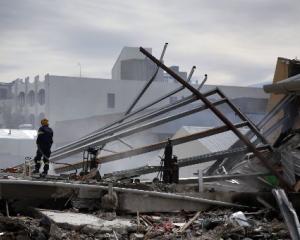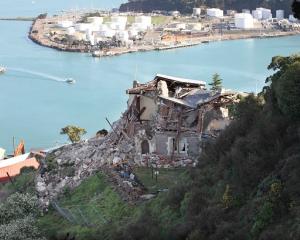We generally enjoy reading Joe Bennett's columns, which are usually informative, thoughtful and entertaining, but his offering last week (ODT, 10.3.11) was of a rather different character and warrants a response.
For reasons unclear to us Bennett took the occurrence of the Christchurch earthquake as an opportunity to launch an attack on the Christian church and what it stands for.
There appear to be three principal points that Bennett wished to make.
The first was the assertion that an omnipotent God wouldn't have let the Christchurch earthquake happen and so the occurrence of such an event should encourage us all to abandon the superstition that there is such a God.
Bennett's second point was that, while churches are entitled to go about their business, the church is, at root, simply a money-making business like any other, and therefore its charitable status should be withdrawn.
And finally, Bennett argued for the separation of Church and State.
Because good works are not the preserve of Christians alone, the church should not receive the privilege of any state sanction.
It is unclear to us why the Christchurch earthquake should have prompted these last two points but we will respond nevertheless.
Beginning with the relationship between Church and State, New Zealand has long been a secular nation, meaning that there is no formal connection between Church and State.
Bennett's point that they are best kept apart is well made, and there can't be many who would want that changed here.
But to argue this separation on the basis that churches are out simply to exploit need and further their own interests is too sweeping.
Is Bennett really suggesting that churches in Christchurch and people working through organisations like the Salvation Army, Presbyterian Support and Catholic Social Services are only in it for the money? How does he know? Would he add to the list of profiteering church goers all those who undertake voluntary work in the community, working with poor and disabled people, setting up and running refugee centres, establishing halfway houses for those seeking to return from prison to full and responsible membership of society, helping build hospitals and schools in third-world contexts, and so on and on ...
Of course Christians are not the only people who do such things, but no Christian we know of has ever claimed such a monopoly.
The more usual position of Christians is to be glad that such altruism and compassion is widespread in society.
Will Bennett not join us in that appreciation rather than seek to disparage those who offer practical compassion as an outworking of their Christian faith? In presenting himself as liberating the people from the deceptions foisted on them by clergy, Bennett is treading a well-worn path.
New Zealand journalists and politicians have been attacking "priestcraft" since the 1840s.
During the colonial period, church- and clergy-bashing tended to peak when Maori Christians, Anglican clergy and missionaries defended Maori land rights and welfare.
More recently, Robert Muldoon told churches to mind their own business when they protested the effects of his Government's policies on the weaker and disadvantaged members of society.
Were the churches then merely serving their own money-making interests? The behaviour of some churches and clergy, not least in our own day, clearly deserves condemnation, but it might be time for this old anticlerical tradition to receive more critical scrutiny.
Finally, it was sad to see Bennett indulge in the all-too-common practice of solving questions that have exercised humanity for centuries - in his case, the problem of evil - without attending to the wisdom accrued over those centuries.
The earthquake happened, dozens died, therefore there is no God. Q.E.D. If only what Bennett calls "God's little earthquake" really were that simple to understand! In fact, the idea of a God who shields humanity from all catastrophe has almost nothing to do with the God disclosed in the Bible.
In Jesus, Christians believe, we learn what God has to do with human suffering and the tragedies of history.
Far from being a remote Puppet Master who shields us from all pain and suffering, God in Christ enters our agony, takes to his own lips the cries of pain and protest and works from within the human condition to bring about redemption and new life.
The Bible provides no easy answers to the problems of human suffering, except as a foil in the book of Job, where platitudes and trite solutions are exposed for the hopelessly inadequate response that they are.
The Bible offers, rather, a rich tradition of wrestling with life's difficult questions, a vocabulary of lament and protest against suffering and injustice, and the hope, based on the resurrection of Jesus from the dead, that there will yet be a future when the pain and the tears of history will be overcome.
Meanwhile, it provides inspiration for Christians to participate in the bringing about of God's purpose that all people should have life in all its fullness.
Earthquakes and tsunamis cause sorrow and lament.
They provide occasion, too, for compassion and for care of our fellow creatures, emerging from the recognition that we are indeed our sisters' and our brothers' keepers.
They do not warrant, we suggest, pious platitudes from Christians about the meaning of such events, nor trite dismissals from its opponents of the value or truth of Christian faith.
• Murray Rae (theology), John Stenhouse (history) and Andrew Bradstock (theology) are academics at the University of Otago.






